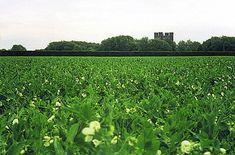
Large parts of the prime pea growing area in the UK have been devastated by the recent floods.
Several thousand acres remain under water in Yorkshire and Lincolnshire five days after the floods that triggered the biggest rescue operation in peacetime Britain. Many other crops escaped the flooding but have been seriously damaged by abnormal May and June rainfall. The excessive rain followed six or seven weeks of heat and drought from late March to early May, which had already put pressure on growers.
“A quick survey of our members reveals that the most optimistic are forecasting a 10-15 per cent shortfall, whilst the worst hit areas are forecasting 60-70 per cent crop loss” said Martin Riggall, chief executive of the Processed Vegetable Growers Association (PVGA).
“The pea plant suffers badly in water-logged soils,” explained Dr Anthony Biddle from the Processors and Growers Research Organisation. “We are seeing higher than normal levels of diseases particularly foot-rot, downy mildew and sclerotinia. Even before the rain, yield prospects were down because of erratic emergence and mixed maturity caused by the dry spring.”
According to the PVGA, the biggest concern is that growers will turn their backs on the crop because the price does not cover the cost of growing and harvesting the crop in anything less than a bumper year. “The UK is recognised around the world as the leading producer of high quality frozen peas but in three of the last four years yield has been reduced by extreme weather patterns that seem to be linked to climate change”, said Riggall.
Producing areas on the continent are understood to be suffering just as badly. “We need the whole supply chain to work together to understand each others problems in a disastrous situation like this, or we fear the UK industry will collapse. Following a short crop last year supermarkets increased retail prices by around 30 per cent, but none of this was passed along the supply chain to help mitigate the losses of the freezing companies and growers. We hope retailers will take a longer-term view this time,” added Riggall.



